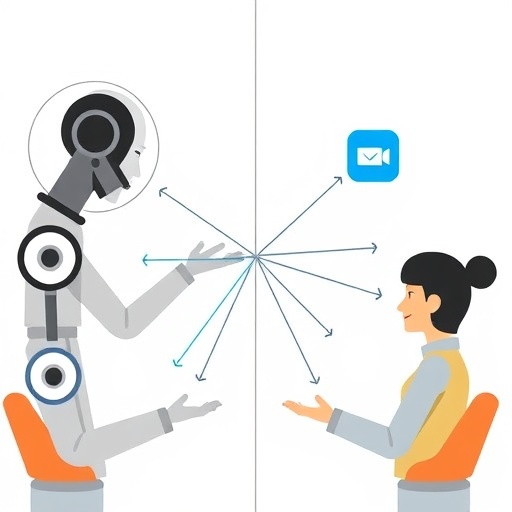In the landscape of education, advancements in artificial intelligence are reshaping the ways in which feedback is generated and received, particularly in peer review settings. A groundbreaking study conducted by Noel et al. and published in BMC Medical Education explores the intricacies of this phenomenon. The research investigates the effectiveness of self-generated versus AI-assisted peer feedback, shedding light on how these two methodologies compare and the implications they hold for the future of educational practices. The findings from this study highlight AI’s growing role in enhancing the traditional feedback process, marking a significant shift in how students might engage with their intellectual development.
At the crux of this exploration lies a critical question: can artificial intelligence deliver peer feedback that rivals or even surpasses what students generate independently? The study employed a randomized methodology, engaging a diverse pool of participants drawn from various academic backgrounds. By contrasting self-generated feedback—where students evaluate their peers based solely on their understanding and perspectives—with AI-assisted feedback, the researchers aimed to discern the nuances in quality and effectiveness between the two approaches. This inquiry not only delves into the mechanics of feedback itself but also probes the psychological and pedagogical implications of technology-driven education.
Throughout the experiment, the participants were divided into two groups. One group utilized AI tools designed to analyze their peer’s work and generate constructive critiques, while the second group relied on their judgment to provide feedback without such technological assistance. This juxtaposition was essential for understanding the tangible benefits and drawbacks of AI integration in educational feedback loops. Participants engaging with AI were equipped with insights derived from advanced algorithms, which evaluated submissions based on criteria often overlooked by human assessors. Such a dichotomy raises essential discussions about the efficacy of human intuition versus machine precision in academic critique.
Initial results from the study suggest that AI-assisted feedback tends to be more structured and anchored in objective criteria, offering an unbiased perspective that may enhance the overall quality of feedback provided. While self-generated feedback often carries personal insights and understanding, it can be marred by cognitive biases and subjective evaluations. The researchers noted that the AI system, having the capability to parse through vast amounts of data quickly, effectively highlighted aspects of the peer submissions that warranted attention—a feat that human evaluators alone might struggle to accomplish consistently.
However, the findings did not entirely undermine the value of self-generated feedback. Participants who engaged in the traditional peer review process articulated their critiques with a depth of understanding, reflecting their individual perspectives and personal experiences with the material. This intimate approach to feedback, while potentially less standardized, cultivated a sense of ownership over the learning material that is invaluable in an academic setting. The study illuminated the complex interplay between objective evaluation and subjective interpretation in pedagogical contexts.
Moreover, the introduction of AI in peer assessments initiates broader discussions about the role of technology in education. As educational institutions grapple with integrating digital tools into traditional learning environments, this study serves as a critical case in point. The researchers emphasize that while AI can enhance feedback mechanisms, it should not replace the essential human elements of connection and mentorship that accompany peer review processes. Emotional intelligence, empathy, and the ability to convey encouragement play vital roles in motivating students and fostering a sense of community in academic circles.
As the study unfolded, it became increasingly clear that successful integration of AI in education hinges on training and adapting both students and educators. Familiarity with the tools available, as well as an understanding of their strengths and limitations, is crucial for maximizing their potential. The researchers highlight the necessity of equipping students with the skills to navigate AI-assisted feedback effectively, fostering a generation that can not only utilize technology but also critically assess its contributions to their learning.
Furthermore, the findings call for a reevaluation of the assessment metrics traditionally employed in academic contexts. As AI tools facilitate a more data-driven approach to feedback, educational frameworks must adapt to prioritize continuous development rather than static assessments. The study posits a future where feedback is an ongoing dialogue, informed by both AI-assisted insights and rich, personal narratives that students bring to the table.
In essence, Noel et al. have illuminated the pathways through which artificial intelligence can revolutionize peer feedback mechanisms, positioned within an educational landscape that embraces innovation while respecting the foundational principles of learning. This balance will be critical as educators seek to harness the strengths of technology without sacrificing the invaluable human interactions that enrich the educational experience.
As the discourse around AI and education continues to evolve, this study places a spotlight on the necessity of research-driven methodologies in understanding the implications of such integrations. Future studies and educational practices will benefit greatly from the insights gleaned from this research. By continuing to explore the effectiveness and limitations of AI-assisted feedback, educators can craft strategies that not only enhance learning but also prepare students for a world increasingly driven by technological advancements.
In conclusion, the study by Noel and colleagues serves as a pivotal moment in the conversation surrounding AI in education. By examining the comparison between self-generated and AI-assisted peer feedback, it offers compelling evidence on how technology can enhance academic interactions. As we reflect on the findings and their implications, it becomes apparent that the future of education must embrace both innovation and the irreplaceable qualities of human mentorship and engagement.
Subject of Research: AI-assisted vs. self-generated peer feedback in educational contexts
Article Title: AI-ding peer feedback: a randomized study of self-generated vs. ai-assisted peer feedback
Article References:
Noel, Z.R., Lee, H., Sherrill, C.H. et al. AI-ding peer feedback: a randomized study of self-generated vs. ai-assisted peer feedback.
BMC Med Educ 25, 1642 (2025). https://doi.org/10.1186/s12909-025-08225-0
Image Credits: AI Generated
DOI: https://doi.org/10.1186/s12909-025-08225-0
Keywords: AI, educational feedback, peer review, artificial intelligence in education, self-generated feedback.




